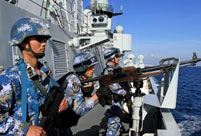 Ni Ni covers BAZAAR JEWELRY
Ni Ni covers BAZAAR JEWELRY
 Cherry blossoms reach peak bloom in Washington D.C.
Cherry blossoms reach peak bloom in Washington D.C.
 Top Chinese fashion icons in foreigners' eyes
Top Chinese fashion icons in foreigners' eyes
 Asia's largest business aviation exhibition to be held in Shanghai
Asia's largest business aviation exhibition to be held in Shanghai
 World's top-rated luxury hotels
World's top-rated luxury hotels
 Wu Jing, Xie Nan to hold wedding on May
Wu Jing, Xie Nan to hold wedding on May
 London Cake International attracts tourists
London Cake International attracts tourists
 Let's dance in harmonic Shaanxi
Let's dance in harmonic Shaanxi
 Christie's to auction dazzling diamonds
Christie's to auction dazzling diamonds
 'Model husband' shatters image of love
'Model husband' shatters image of love
ISLAMABAD, April 17 -- The Pakistan Taliban has announced the lifting of its self-imposed ceasefire as it blamed the government of Prime Minister Nawaz Sharif for continued operations against them and for failing to meet their initial demands.
Observers said that with the ceasefire lifted, more terror attacks across the country would be expected and the stalemate in the peace dialogue would stay.
Shahidullah Shahid, spokesman of Tehrik-e-Taliban Pakistan, however, said on Wednesday that despite the lifting of the ceasefire, they would still continue the peace dialogue with the government.
The Taliban's ceasefire expired on April 10. They had earlier declared a month-long ceasefire on March 1 and later extended it for 10 more days during their talks with the government. Although terror attacks were not completely stopped during the Taliban's 40- day ceasefire, there was a substantial decrease in violent incidents.
A senior government minister viewed the Taliban refusal to extend the ceasefire as a pressure tactics to press for more concessions from the government.
But Minister for States and Frontier Regions, Abdul Qadir Baloch, has said that the Taliban is mistaken if it wants to blackmail the government.
Some analysts said that the lifting of the ceasefire could be a psychological ploy to mount pressure on the government and the security forces to accept their demands but this approach may not work.
The Taliban are not strong enough to give a tough time to the security forces and they would be the real loser in case they again resort to terror attacks, one analyst said.
Despite the peace process, the government has adopted a policy that requires security forces to respond to any Taliban attack. In line with this policy, the security forces had launched air strikes against the Taliban hideouts in Waziristan tribal after a Taliban bomber used an explosive-packed truck to target a convoy of security forces in January this year.
Over 20 security men were killed in the deadly bombing in the northwestern district of Bannu.
This strategy of the government had forced the Taliban to come to the negotiating table and to declare a unilateral ceasefire. The government has not officially responded by calling its own ceasefire.
On the contrary, National Security Adviser Sartaj Aziz has warned the Taliban that they will be targeted in their own hideouts if they continue to carry out terror attacks.
A consensus has also emerged in Pakistan that favors a major military offensive against the Taliban if the option of dialogue would not succeed this time. Prime Minister Sharif, who had earlier vowed to give peace another chance, also hinted of using the full force of the government against the Taliban if peace efforts fail.
Pakistani security establishment wants a complete control over all regions bordering Afghanistan and drive the Taliban militants from there ahead of the U.S.-led NATO forces from Afghanistan later this year.
Pakistan cannot afford further negative impact of any instability in the country if fighting is intensified in the post- NATO Afghanistan. It is widely believed that the Army will opt for a complete control over all border areas even if the dialogue process, which is now on stalemate, would resume.
The government has already bent backward by suspending airstrikes against the militants' hideout in the Waziristan tribal region to keep the dialogue process on track.
 Children in ancient costumes learn Zhusuan
Children in ancient costumes learn Zhusuan Tens of thousands celebrate Water Splashing Festival
Tens of thousands celebrate Water Splashing Festival A bite of China II whets the appetite
A bite of China II whets the appetite Chinese frigate completes its 14th escort mission
Chinese frigate completes its 14th escort mission Let's dance in wealthy Shaanxi
Let's dance in wealthy Shaanxi A date with 798: feel the art around you
A date with 798: feel the art around you 3D-printed houses built in Shanghai
3D-printed houses built in Shanghai World largest scale of umbrella dance
World largest scale of umbrella dance Cherry blossoms reach peak bloom in Washington D.C.
Cherry blossoms reach peak bloom in Washington D.C. The backstage of the Fashion Week
The backstage of the Fashion Week College students in Han costumes
College students in Han costumes Postgraduate works as waitress
Postgraduate works as waitress Life in a Lahu village in Yunnan
Life in a Lahu village in Yunnan An orphan’s wedding
An orphan’s wedding Hollywood documentary brings Diaoyu Islands truth to new audience
Hollywood documentary brings Diaoyu Islands truth to new audienceDay|Week|Month